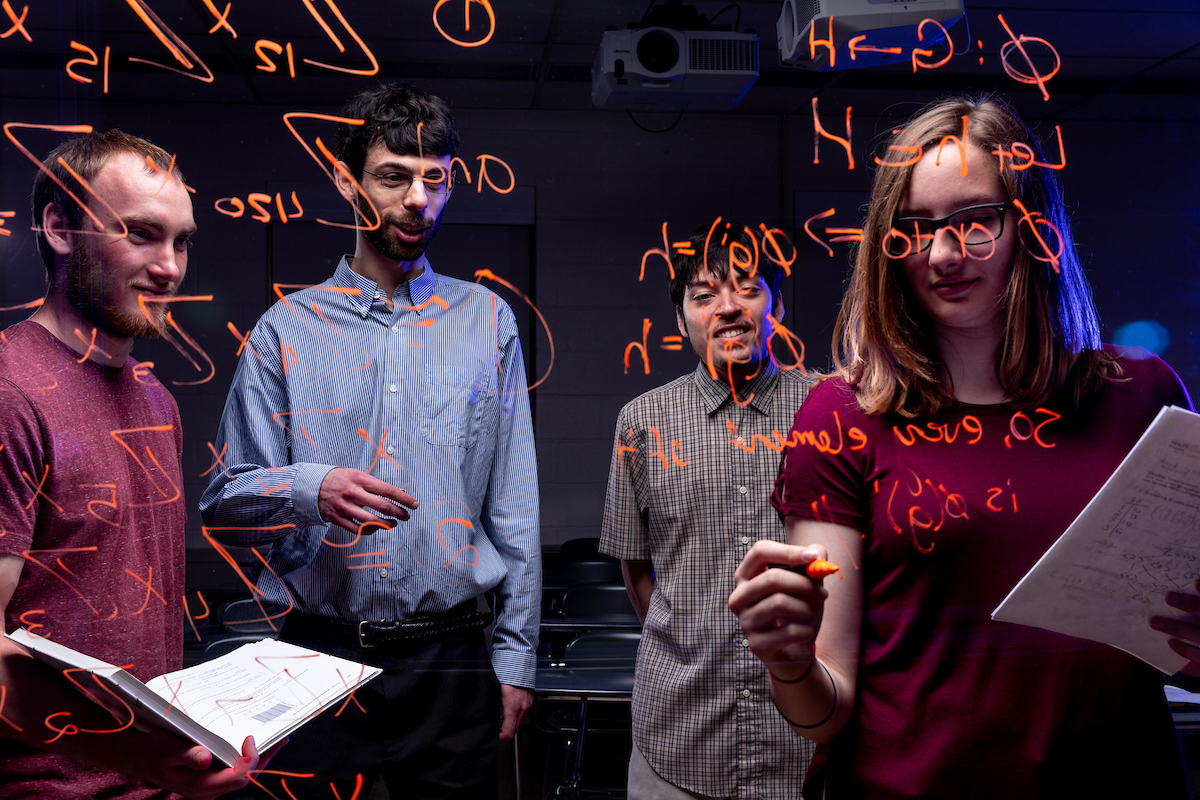EMACS Scholars Program
The Emerging Mathematics and Computer Science (EMACS) Scholars Program is a Kutztown University program funded by the National Science Foundation (NSF) to support academically talented students with financial need in their pursuit of degrees in Mathematics, Computer Science, and Information Technology.
The Emerging Mathematics and Computer Science (EMACS) Scholars Program at Kutztown University has many key features, including:
- Generous financial support.
- A Living Learning Community in which all scholars live in the same residence hall and take many of the same classes. Scholars may choose to room with a student not in the program. Exceptions to the housing requirement for transfer students may be considered on a case-by-case basis.
- Numerous academic and social opportunities.
- Support in the form of peer tutors, faculty mentors, and industry mentors.
Have questions not answered below? Please contact us!
The EMACS Scholars Program is funded by S-STEM Award 2029357 from the National Science Foundation (NSF).

Financial Support
EMACS scholars receive a renewable scholarship of $8300 per year, assuming satisfactory academic progress, program participation, and financial eligibility. By combining this support with other scholarships and grants, EMACS scholars may be able to complete their degree at minimal actual expense.
To see how this could be possible, please see the following scenario (which uses 2022-2023 estimates for a first-year Pennsylvania resident who lives on campus). The term "direct costs" includes tuition, mandatory fees, and room & board.
Scenario: Full Pell and PHEAA Grants
|
Estimated Direct Costs |
$22,545 |
|
EMACS Scholarship |
-$8,300 |
|
Full Pell Grant |
-$6,895 |
|
Full PHEAA State Grant |
-$4,894 |
|
Estimated Annual Actual Expense |
=$2,456 (students may qualify for additional aid) |
Program Eligibility Information
To be considered for the EMACS Scholars Program, students must:
- be U.S. citizens, nationals, or permanent residents,
- demonstrate academic ability and commitment (possible evidence could include high school GPA, SAT scores, application essays, and letters of recommendation),
- be eligible for a Pell Grant as determined by the FAFSA form,
- be admitted to Kutztown University, and
- intend to major in Mathematics, Computer Science, Information Technology, or Game Development.
Please note that students MUST complete their FAFSA and be eligible for a Pell Grant before they can be accepted into the EMACS Scholars Program.
Program Application Information
The EMACS Scholars Program will have two deadlines to consider applications for students enrolling in Fall 2023.
- Apply by December 1, 2022 to guarantee early consideration.
- Apply by March 1, 2023 to guarantee consideration - after March 1, we will continue to accept applications until all positions are filled.
high-quality academic programs
Programs in the Department of Mathematics and the Department of Computer Science and Information Technology have the following features that stand out:
- Classes are small, so students receive personalized attention from faculty members.
- Our faculty have industrial and research experience that enriches the curriculum.
- Faculty are engaged in research, and actively seek to include undergraduate students.
- Our programs prepare students for STEM careers or masters and doctoral programs to further their education.
|
Department of Mathematics |
Department of Computer Science and Information Technology |
|
| Program | ||
| Faculty/Student Research Areas |
|
|
| Highlighted Course Opportunities |
|
|
| Student Clubs |
|
- More Information about the Mathematics Program
- More Information about the Computer Science and Information Technology Programs
Peer-tutoring
Our programs offer additional learning experiences through the help of Supplemental Instructors (SIs), the Tutoring Labs, and Living-Learning Communities (LLC). Not only can students take advantage of these free services, but experienced scholars can become an SI or tutor, which are paid positions.
- More Information on Supplemental Instruction
- More Information on Tutoring Labs
- More Information on Living-Learning Communities
Mentors & Internships
Although not required, internships are strongly encouraged in mathematics, computer science, and information technology programs. Our experienced faculty also mentor students in research projects, both at Kutztown and at national Research Experiences for Undergraduates (REUs) Programs at other institutions. Internships provide an excellent opportunity for students to apply their learned knowledge to real-life scenarios and projects, as well as help build strong experiences that will make their resumes stand out to potential employers. For students interested in furthering their education in graduate school, research projects guided by KU faculty give students an advantage on graduate school applications.
successful Graduates
Many of our graduates have left the university with well paying occupations in a variety of sectors including healthcare, information technology, education, and finance. Below are a few examples of the careers that our graduates have undertaken after finishing a mathematics, computer science, or IT degree at KU. Click here to read more about what a few of our recent graduates are doing!
brain teaser
Does every counting number have a positive multiple whose digits are only 0s and 1s?
If your answer is yes, you should explain why this is possible for EVERY counting number. If your answer is no, you should find a particular number that does not have such a multiple and explain why.
After writing down your answer, check out this video where Dr. Tony Wong, Kutztown University mathematics professor, explains his solution!
Contact us
Have questions that are not answered on this page? Contact us!






